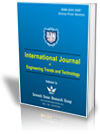Impact of Emulsified Water/Diesel Mixture on Engine Performance and Environment
 |
International Journal of Engineering Trends and Technology (IJETT) |  |
| © 2016 by IJETT Journal | ||
| Volume-36 Number-9 |
||
| Year of Publication : 2016 | ||
| Authors : Mayur Dubey, Dr.Vishal Saxena |
||
| DOI : 10.14445/22315381/IJETT-V36P283 |
Citation
Mayur Dubey, Dr.Vishal Saxena"Impact of Emulsified Water/Diesel Mixture on Engine Performance and Environment", International Journal of Engineering Trends and Technology (IJETT), V36(9),461-466 June 2016. ISSN:2231-5381. www.ijettjournal.org. published by seventh sense research group
Abstract
An experimental investigation was carried out to produce a stable diesel-water emulsion fuel to be used in a diesel engine under different operating conditions. The proper mixing technique and emulsifying agent were used to produce stable emulsions of 10% to 30 % water by volume in diesel. The stability of these emulsions ranges from one week up to 4 weeks. The physical properties of stable water-diesel emulsions such as density, viscosity and pour point were observed. The effect of water-diesel concentrations, on the performance of a single cylinder diesel engine in terms of engine speed, torque, brake power output, brake specific fuel consumption, brake thermal efficiency, exhaust gas temperature and emissions such as NOx and particulate matter (PM) were studied. The results showed that the water emulsification has a potential to improve the diesel engine performance and to reduce gas pollutants.
References
[1] Nadeem M., C. Rangkuti, K. Anuar, M. Haq, I. B.Tan and S. Shah, Diesel engine performance and emission evaluation using emulsified fuels stabilized by conventional and gemini surfactants, Fuel, Volume 85, Issues 14-15, October 2006, Pages 2111-2119.
[2] Samec, N., B. Kegl, and R.W. Dibble, Numerical and experimental study of water/oil emulsified fuel combustion in a diesel engine, Fuel, Volume 81, Issue 16, 2002, Pages 2035-2044
[3] Park JW, KY. Huh, JH. Lee, Reduction of NOx, smoke and brake specific fuel consumption with optimal injection timing and emulsion ratio of water-emulsified Diesel. Proc Inst Mech Eng 2001; 215:83–93. http.dx.doi.org/10.1243/0954407011525476
[4] Andrews GE, Bartle KD, Pang SW, Nurein AM and Williams PT, 1988, the reduction in Diesel particulate emissions using emulsified fuels. SAE paper. 880348.
[5] Park JW, Huh KY and Park KH., 2000, Experimental study on the combustion characteristics of emulsified Diesel in a rapid compression and expansion machine. Proc Inst Mech Eng ;214(Part D):579–86.
[6] Ocampo-Barrera R, R. Villasenior, A. Diego-Mar?an, An experimental study of the water content on combustion of heavy fuel oil/water emulsion droplets. Combustion & Flame;126:1845–55,.2001. http.dx.doi.org/10.1016/S0010- 2180(01)00295-4
[7] Harbach JA and V. Agosta, Effects of emulsified fuel on combustion in a four-stroke Diesel engine. J Ship Res.;35(4), 1991, pp: 356–63.
[8] Tsukahara M, Yoshimoto Y., 1992, Reduction of NOx, smoke, BSFC, and maximum combustion pressure by low compression ratios in a Diesel engine fuelled by emulsified fuel. SAE paper 920464; 1992.
[9] Selim, MYE, and SMS. Elfeky, Effects of Diesel/water emulsion on heat flow and thermal loading in a pre combustion chamber Diesel engine. Appl Thermal Eng; 21, 2001, 1565–82. http.dx.doi.org/10.1016/S1359- 4311(01)00019-9
[10] Desantes JM, J. Arre`gle, S. Ruiz, A. Delage, P.Schmelezle, O.Esmilaire, Characterisation of the injection-combustion process in a common rail D.I. Diesel engine running with fuel–water emulsion. Proceedings of EAEC Congress, Barcelona 1999 pp. 59–68.
[11] Kadota T and H. Yamasaki, Recent advances in the combustion of water fuel emulsion, Progress in Energy and Combustion Science, Volume 28, Issue 5, 2002, Pages 385-404. http.dx.doi.org/10.1016/S0360-1285(02)00005-9
[12] Odaka M, N. Koike, Y. Tsukamoto, Reduction effect of emulsified fuel on NOx and smoke emissions from direct injection Diesel engines. 9303537. JSAE Rev 1993;14(2).
[13] Lif A. and K. Holmberg, Water-in-diesel emulsions and related systems, Advances in Colloid and Interface Science, Volumes 123-126, 16 November 2006, Pages231-239. http.dx.doi.org/10.1016/j.cis.2006.05.004
[14] Abu-Zaid M.,Performance of single cylinder, direct injection Diesel engine using water fuel emulsions, Energy Conversion and Management, 2004, 45 (5), 697- 705.http.dx.doi.org/10.1016/S0196-8904(03)00179-1
[15] Ghojel J.,D.Honnery., K. Al-Khaleefi, Performance, emissions and heat release characteristics of direct injection diesel engine operating on diesel oil emulsion, Applied Thermal Engineering, Volume 26, Issues 17-18,m2006, Pages 2132-2141
[16] Armas O., R. Ballesteros., FJ. Martos., and J. R. Agudelo, Characterization of light duty Diesel engine pollutant emissions using water-emulsified fuel, Fuel, Volume 84, Issues 7-8, 2005, Pages 1011-1018.
[17] Kannan, K., M. Udayakumar, NOx and HC emission control using water emulsified diesel in single cylinder diesel engine. ARPN Journal of Engineering and Applied Sciences. Vol.4, No. 8, 2009.
Keywords
Diesel Engine, Water Diesel Emulsions, Physical Properties, Engine speed, Brake Power Output.

